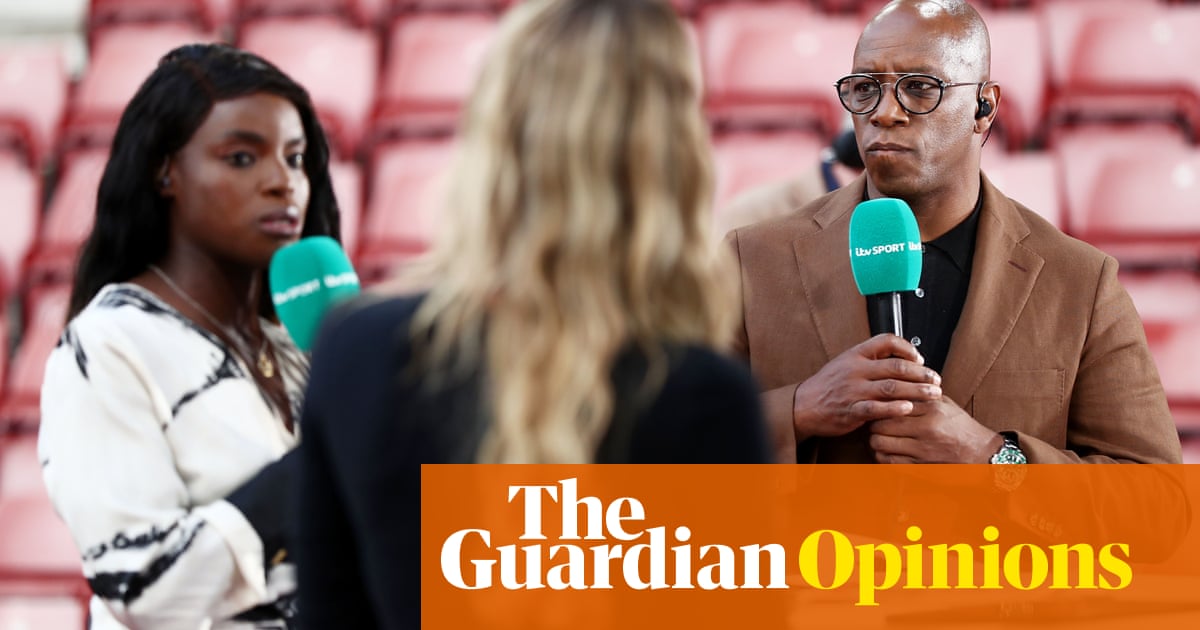The former England international Eni Aluko’s appearance on BBC Radio 4’s Woman’s Hour prompted lines to be drawn between her and fellow pundit Ian Wright. “There’s a finite amount of opportunities and I think that men need to be aware of that,” said Aluko, when asked whether it was wrong that Wright was covering women’s football. The affair has been messy, with Aluko, a trailblazer in many areas, publicly apologising and Wright, a passionate champion of the women’s game beloved by players and fans for that support, rejecting the apology.
It has been a wholly disappointing episode that has, in focusing on Wright, drawn attention away from a legitimate conversation on whether the number of women pundits, commentators and presenters in football is improving.
It is 11 years since Aluko became the first woman to appear as a pundit on Match of the Day, 18 since Jacqui Oatley became the flagship programme’s first female commentator and 20 since Celina Hinchcliffe became the first woman to present the show. Things look very different today with two of the three-person team replacing Gary Lineker on MotD women, Kelly Cates and Gabby Logan joining Mark Chapman in sharing hosting duties being the most prominent example.
Across TV and radio broadcast coverage of both men’s and women’s football female presenters, commentators and pundits are increasingly common. There is still work to be done though. There is a significant lack of ethnic diversity while, across journalism, class and disability are two woefully overlooked areas.
One area that requires improvement is which games women are working on. For the England men’s two most recent World Cup qualifying fixtures, against Albania and Latvia, not a single woman worked as a pundit, commentator or presenter on ITV’s television coverage, and only one, Izzy Christiansen, provided co-commentary on the latter of the two fixtures for BBC Radio 5 Live.
Broadcasters, as well as print and online media, need to do better, entrusting their showpiece fixtures to the excellent women on their rosters in both the women’s and men’s games with greater frequency. Diversity is not about being tokenistic. Research has repeatedly showed that, in business, diverse teams perform better. There can be little doubt that diversity, in all its forms, in sports broadcasting would prompt better, more rounded and broader conversations.
The decision of Alex Scott, who is in a same-sex relationship, to wear the One Love rainbow armband and speak eloquently about its significance during coverage of the men’s World Cup in Qatar, while players were silent on the issue, is an example of the impact diversity on the screen can have.
Dinosaur views, particularly those aired on social media, will remain for as long as there are issues with gender equality in society. Outdated views on women are present in all industries to varying degrees. Gender inequality is built into the fabric of society and maintained through the continuation of historic biases and systemic issues such as the gender pay gap, discrimination at work, poor maternity pay, gender inequality in the legal system and much more.
From keyboard warriors to people from whom we expect more, there will always be those looking to stamp women down. The former MOTD presenter Des Lynam, a career journalist who did not play sport professionally, told Radio Times last year that, while he had “no gripe” with female presenters, pundits should have “played it at the level you are talking about – ie the men’s game”. He has previously described women’s voices as “grating” and “not so attractive for actual commentating”.
However, the support for Cates and Logan following their announcement they would be part of the MotD presenting team, the support for Aluko and Lucy Ward after Joey Barton took aim at them, the acclaim heaped on Emma Hayes for her punditry and the praise of Wright’s women’s football advocacy following Aluko’s recent comments, are just some examples of the growing normality of diversity in football journalism.
after newsletter promotion
That is encouraging, but there is still a long way to go.
Get in touch
If you have any questions or comments about any of our newsletters please email [email protected].
-
This is an extract from our free weekly email, Moving the Goalposts. To get the full edition, visit this page and follow the instructions. Moving the Goalposts is back in to its twice-weekly format, delivered to your inboxes every Tuesday and Thursday.
